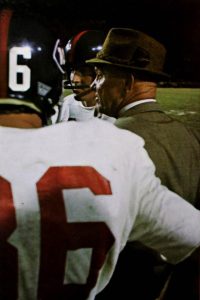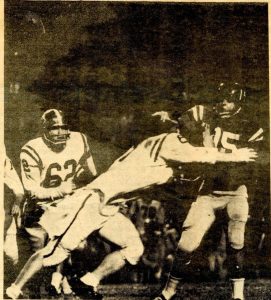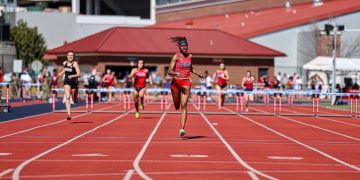EDITOR’S NOTE: In this story, Sports Editor Aidan Gallardo goes in depth about what the 1962 Ole Miss football team endured during an unforgettable season. Some information and all of the quotes come from ESPN’s “30 for 30: Ghosts of Ole Miss.”

Football has been the heart and soul of the University of Mississippi for more than 115 years and through all that time, one season and its players stand out from the rest: the 1962 Ole Miss football team.
That year, the Rebels went undefeated but were greatly overshadowed by a watershed moment in the civil rights movement that took place on their very campus.
In its prime, Ole Miss was better than any other team in the nation. The players and coaches expected to win every game. Over the span of 10 years prior to their undefeated season, the Rebels averaged just 1.5 losses per year.
During the five years before the perfect season, Ole Miss had a bowl appearance each year and won three SEC Championships. They were a powerhouse in college football and were practically unstoppable.
But what’s the reason behind the success for all those years? You can turn to none other than head coach Johnny Vaught.
Vaught’s first season at Ole Miss was as an assistant coach in 1946, and after just one year, he took over the reins as head coach and began what would soon become a legendary coaching career.
Vaught served as Ole Miss’ head coach for 24 years (1947-1970, 1973), with an overall record of 190-61-12. He was a six-time SEC coach of the year and in 1982, Ole Miss added his name to Hemingway Stadium, where it remains to this day (Vaught-Hemingway Stadium). The Hall of Fame coach will forever be remembered at the University of Mississippi.
As Coach Vaught and his Rebels embarked on their historic 1962 football season, the university itself was in the international spotlight for events on campus sparked by integration.
On Oct. 1, 1962, James Meredith enrolled at the University of Mississippi as its first African American student. Protests, acts of violence and a riot ensued on campus, and the local society was in a state of disarray.
President John F. Kennedy sent military troops to protect Meredith and maintain social order. U.S. marshals surrounded the Lyceum in riot gear during the peak of the protests and during that time, the campus looked like a war zone.
The football team had already kicked off its season with games in Memphis and Jackson, and during the week of Meredith’s enrollment, Ole Miss had a Saturday, Oct. 6, contest scheduled against Houston. It also happened to be the homecoming game, set to take place at Hemingway Stadium.
To make sure his players were safe during the violent night of Meredith’s enrollment, Vaught didn’t want anyone to leave their dormitory rooms.
Third-string quarterback Bobby Boyd and running back George M. “Buck” Randall wanted to see the protests that were concentrated around the Lyceum.
“I got in my bed, and I can hear the noise going on over there,” Boyd said. “And I thought ‘What in the world are they doing?’ I got to see what’s going on. So I just reached over there, and I raised the window and slipped out the window.”
Some politicians demanded the school shut down, but the football team’s success was the formidable barrier that prevented that from happening.
After tense negotiations involving university, state and federal officials, the game was rescheduled for Mississippi Memorial Stadium in Jackson.
There was a strange ambience on the day of the game against Houston, and Vaught knew that. So he got his players together in the locker room and told them to be unified.
“He would tell us, ‘We’ve got to stay together. We’ve got to win. We’ve got to show the world that we’re not all bad,’” starting quarterback Glynn Griffing said about Vaught’s speech before the game.

Ole Miss ended up blowing out Houston 40-7 and got off to a 3-0 start.
But despite winning against Tulane and Vanderbilt the following weeks by a combined score of 56-0, the Rebels dropped from No. 5 to No. 6 in the rankings. Many fans of Ole Miss questioned if the drop in the poll was a response to the riots on campus. Looking back on it, there’s no doubt that was the reasoning behind some poll voters.
Even though the Rebels were rolling to start out their season, they had to travel to Baton Rouge to face an LSU squad that had ruined Ole Miss’ chances at perfect records over the past four years. They were the Rebels’ “kryptonite.”
Ole Miss looked a step slow in the first half against the Tigers, and it didn’t feel like another one of their dominating games. By halftime, the score was 7-7, and fans began to worry that the Rebels weren’t going to be able to get it done. But, they eventually regained their footing in the second half and won the game 15-7 to keep their perfect season alive.
“After we whipped LSU down there in Baton Rouge, we felt like we could play with anybody,” Griffing said.
The next game, the Rebels played Chattanooga and smoked them out of the water, winning 52-7, their largest margin of victory that season.
The Rebels were feeling good, and they planned to take out any team that got in their way.
Eventually, the Rebels would no longer have blowout wins. Their games towards the end of the season were a little bit too close for comfort.
With just a seven point lead towards the later stages of the game against Tennessee, the Rebels needed a stop on defense. The Volunteers were in the red zone and were about to take the lead against Ole Miss when all of a sudden defensive back Louis Guy caught an interception in the end zone and took it all the way to the other side of the field for a 103-yard pick-six to seal the victory.
The following week, Ole Miss faced in-state rival Mississippi State and the Rebels’ backup quarterback, Jim Weatherly, was the hero of the game as he botched a handoff to the running back and ended up keeping the ball himself. The funny thing is, that play should’ve been blown up immediately, but somehow, Weatherly was all alone on the right side of the field running into the endzone to win the game 13-6. After that wild finish, the Rebels were 9-0, one game away from perfection.

Photo courtesy: The Ole Miss Yearbook.
“Our trainer came running out on the field, and I was laughing,” Weatherly said right after he scored the game-winning touchdown. “‘Doc, I missed the handoff.’ And he said, ‘Don’t tell anybody.’”
Ole Miss was crowned SEC champion and ranked No. 3 with a trip to the Sugar Bowl.
“Everyone wanted to be No. 1, and we felt like we deserved to be,” Griffing said. “But when you go through a season like we had had and all the negative publicity that came with that, you got a lot of people not going to vote for you.”
The Rebels played Arkansas in the Sugar Bowl and defeated the Razorbacks 17-13 to officially finish their 1962 season with a perfect 10-0 record.
There are still signs of honor and remembrance of the 1962 football team on the Ole Miss campus today. The “Walk of Champions” was dedicated to the team in 1998 and every home game since, each year’s team walks down the path, through the Grove and into Vaught-Hemingway Stadium.
It is truly remarkable how the football team played to a perfect record despite the chaos that went on at the university. It’s one thing to have an undefeated record, but it’s another to do so when there’s a fight for social justice happening in your backyard.
The Rebels showed heart, toughness, resilience and perseverance. At the end of the day, the 1962 Ole Miss football team achieved the impossible: a perfect season.


























